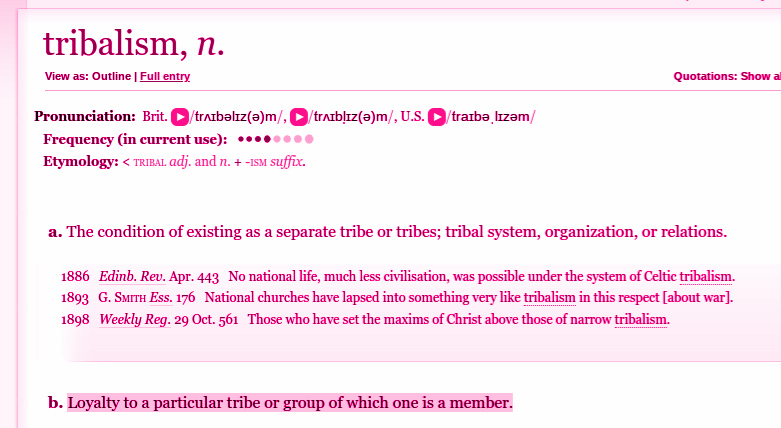Tribalism sucks. But also: calling it tribalism sucks.

I’m going to break a pretty major rule of writing right now, not just because it’s my blog and I can do as I like, but because in this case it’s the literal subject of the post: I’m going to start with a definition.
The Oxford English Dictionary defines tribalism in the following way:
tribalism, n.
Pronunciation: Brit. /trʌɪbəlɪz(ə)m/, /trʌɪbl̩ɪz(ə)m/, U.S. /traɪbəˌlɪzəm/
a. The condition of existing as a separate tribe or tribes; tribal system, organization, or relations.
b. Loyalty to a particular tribe or group of which one is a member.
It’s a word you hear a lot these days, and it’s almost entirely referring to meaning b. And among those references, it’s essentially always in relation to a “group of which one is a member” and almost never in relation to a “tribe.”
What they’re talking about is the increasing tendency, especially in America, to hold all your opinions not based on facts and evidence, but based on a sense of identity. It doesn’t matter, for instance, if you’re white and lower-middle-class and that you won’t see a dime of the trillion dollar tax cut, because Bob who’s been working at Wal-Mart for twenty years got a thousand dollars, and you like Bob because he’s a lot like you.
“Tribalism,” as we’re calling it, is a short-circuit in our brains. We automatically sort people—automatically, as in, without even thinking about it, not on purpose—into “in groups” and “out groups.” My people and your people.
This crappy part of our brains was probably useful once upon a time. If you’re a hunter-gatherer in a hostile landscape, banding together with a limited group of others to gather and defend resources is a great idea in an evolutionary system. It helps strike the balance between effort-sharing, profit distribution, and competition. If you work together, you do better—to a certain point. When the group gets too big, your share goes down because of various inefficiencies. Plus, of course, it’s pretty profitable to kill and steal from other groups, so everyone being in the same group limits whose lives you can destroy for your own gain. Humans are the particularly nasty result of, well, really it’s thermodynamics, but we can talk about that later. The point is, we (the descendants of the survivors of this system) used to find it really profitable to band together and lock others out.
And now that we all have to live together, and now that we don’t (openly, at least) accept that murdering others for what they have is an acceptable practice, it’s a piece of particularly destructive evolutionary baggage.
Economics mostly operates on the idea that people are, by and large, “rational actors” who do what’s in their own best interests, except that we don’t and a lot of that is because limited acts of altruism—only for the in group, you understand—are also, weirdly, advantageous. Add to that the modern problems of propaganda, bizarro political identity formation, and shifting demographics, and you get poor white male Christian Mike defending tooth and nail the need for tax breaks for billionaire white male Christian Ted at the expense of his own social safety net.
So: tribalism sucks.
But also: calling it tribalism sucks.
As someone who’s studied the Middle Ages more than most, I have a chip on my shoulder about the way scholars of earlier years created the myth of the “Dark Ages,” a period of unenlightened thinking between the totes amazeballs Roman Empire and the second coming of awesomesauce the Renaissance. I mean they literally called it the “rebirth,” as though all through the Middle Ages culture and thinking were dead. This is a lie. But part of how that lie operated was in the naming of things.
The Romans built “roads.” The insular people of the “Dark Ages” made “trackways.” I kid you not. Roman roads and “Anglo-Saxon” trackways. Nomenclature carries meaning with it, and it’s rarely innocent. In this case, it’s used to imply “primitivism,” a devaluation of a thing because it doesn’t fit a certain model of “modernity” or the then-prevailing (deeply-flawed) view of “progress.”
And that’s why I hate that we’re calling in-group/out-group dynamics “tribalism,” because we (and by we I mean western colonizers) have spent hundreds of years using the word “tribe” to denote that same kind of primitivism.
Look at the first line of the Wikipedia definition of “tribe”: “A tribe is viewed, developmentally or historically, as a social group existing outside of or before the development of states.” It’s the “developmentally” and “before” that’s the problem there. We’ve spent so long making a distinction between “civilized” people who live in “nations” and “primitive” people who live in “tribes.”
Now step back and look at what we’re doing with “tribalism.” We’re taking something decidedly negative, an evolutionary throwback in our brains that causes us to be irrational and nasty to one another, and we’re calling it by the name of a form of social organization that we’ve historically denigrated for being “primitive.”
Calling something as dangerous as in-group/out-group prejudice “tribalism,” to me, sounds pretty damn insulting to everyone whose social organization white colonizers have spent the last centuries calling “tribal” as a placeholder for “primitive.”
So here’s my suggestion: let’s stop. Don’t call it tribalism. Call it factionalism. Call it identitarianism maybe, or sectarianism. Call it in-group/out-group community formation. Call it literally anything but “tribalism.”
Let’s try to stop factionalism (or whatever we agree to call it), but let’s also try to stop calling it that, too.
Signed: The Remixologist
***
Featured image: The definition of “tribalism” from the Oxford English Dictionary (Online). Source: OED.
